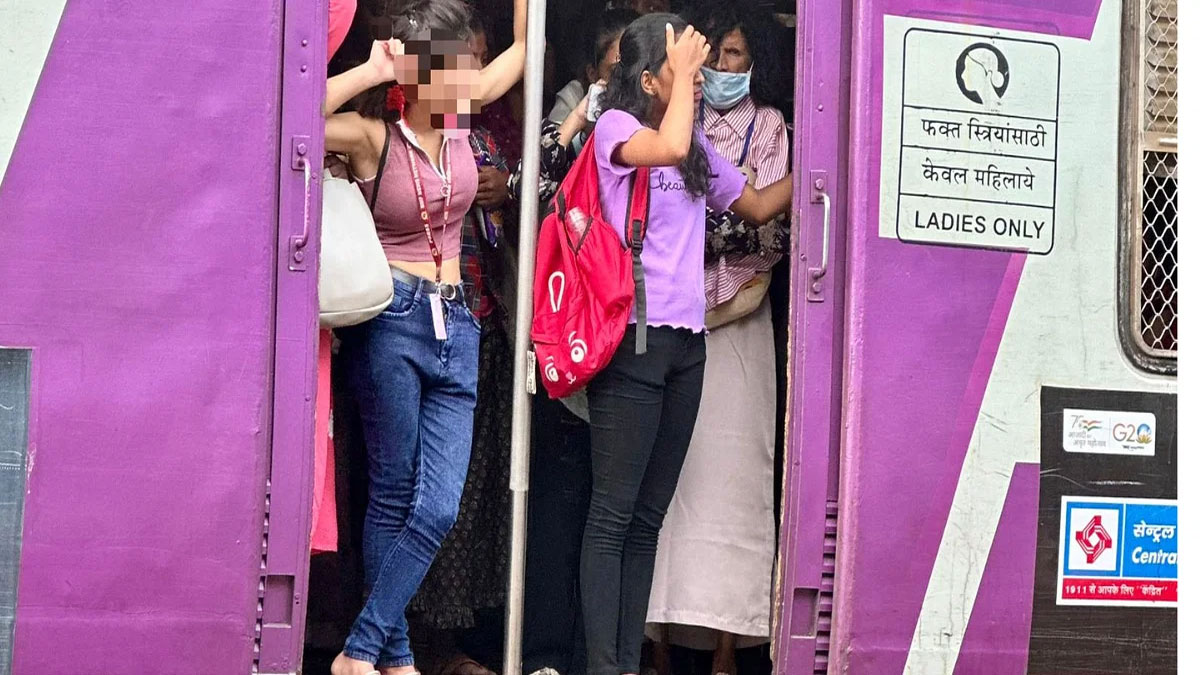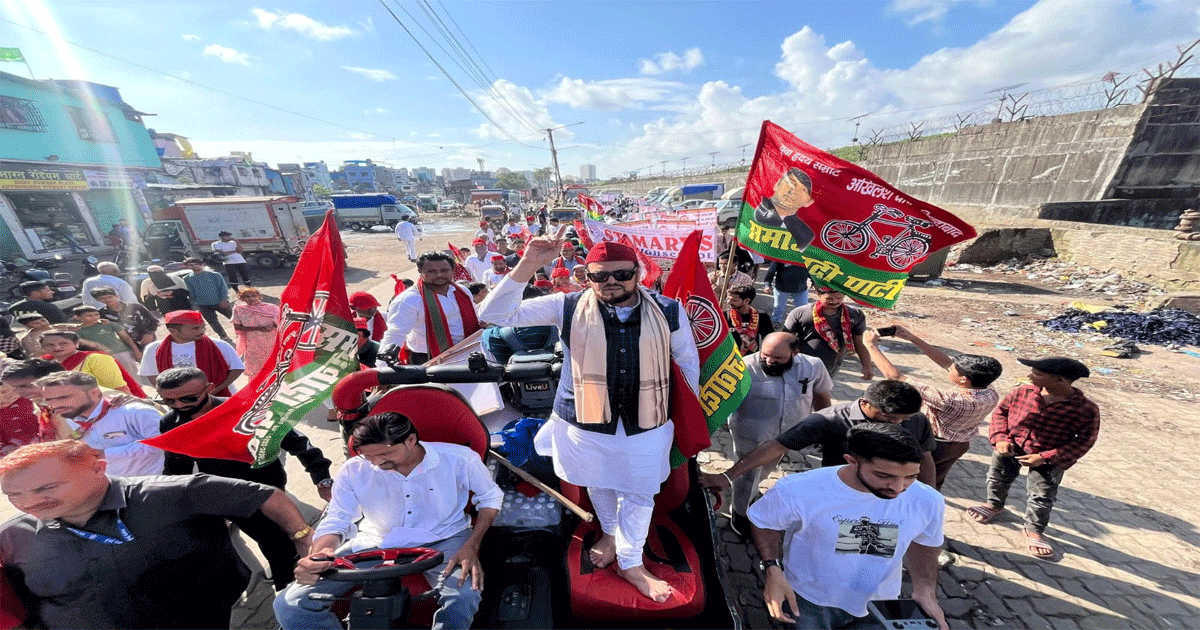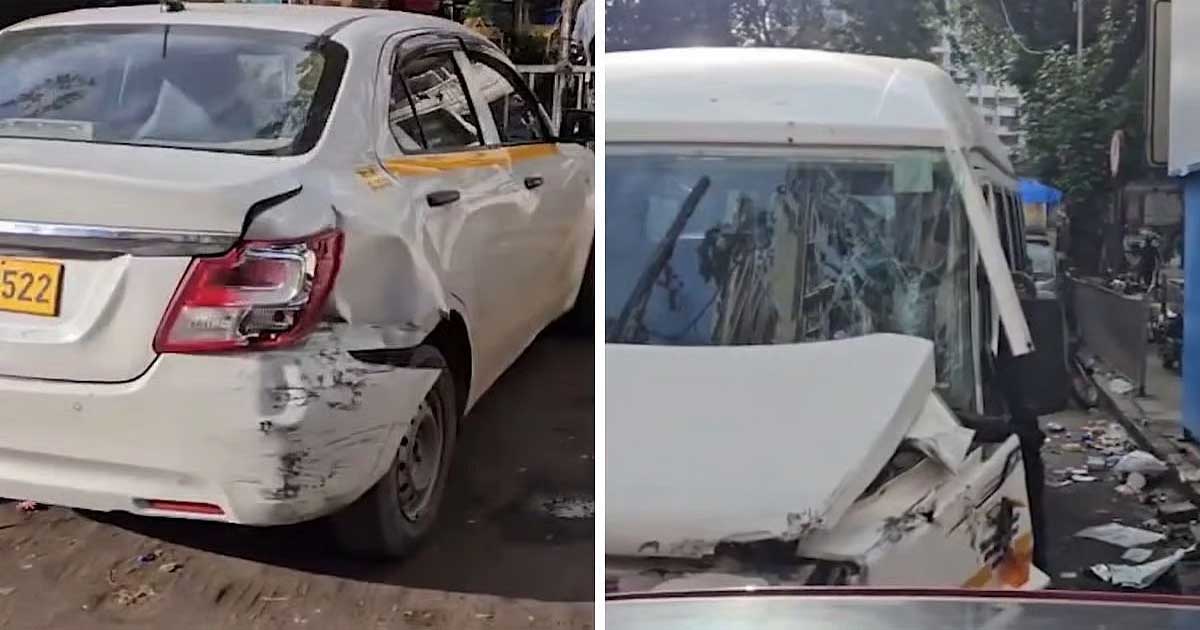Maharashtra
We Say Mumbai Is Safe, But Is It? Students Speak

Mumbai: The horrifying sexual attack on a 20-year-old girl in a local train between Masjid Bandar and Chhatrapati Shivaji Maharaj Terminus (CSMT) stations on the Harbour line at 7.28 a.m. has raised ‘security’ concerns. And this time not just about women but particularly students- because the torture and murder of a girl in a Mumbai hostel lastweek still haunts. Are Mumbai’s students not safe either?
Female student commuters from Mumbai who travel on the Harbour Lines at odd hours report feeling uncomfortable both inside the trains and on the platforms due to insufficient protection.
Although policewomen are present at major city railway stations, women commuters at smaller stations suffer the most. Padma Ahale, a student at Sophia College, takes the Harbour Line from Ram Mandir to Bandra and then to her college. “Security is a major concern, especially at smaller stations where there are no police officers on duty all day. I also believe that younger boys should not be allowed to board the ladies’ section, given the increase in juvenile cases,” she argues. Padma believes that it is usually preferable to board a general compartment rather than an empty ladies’ compartment.
One would wonder why Padma takes the Harbour Line when she has direct access to the Western Line. The reason is that the Harbour Line tends to be emptier during non-peak hours as compared to Western Line, which is normally crowded throughout the day.
However, the issue does not end with the lack of police officers at these railway stations. Late at night, some of the busiest and most densely populated stations, such as Chhatrapati Shivaji Terminus (CST) or Victoria Terminus (VT), become risky for female commuters. Shalini Shah, an SNDT College student who had to travel at night for research assignments, until recently, says, “I think the ladies’ compartments should be completely closed off because some trains have common coaches separated by only a grille above their seats.” The male gaze makes you feel uneasy, especially if you’re travelling late.”
Last year, Shalini said she witnessed a woman being abused on her way back from CST station. “Perhaps I’ve been fortunate enough not to have encountered an unpleasant incident, but that doesn’t mean it doesn’t happen,” she says. “The offender was seen on CCTV, but by the time the authorities intervened, the culprit had already left,” she continued.
Pearl Karanjia, a student at SVKM’s Mithibai College, on the other hand, has no reservations, even though she travels late on some days. “I’ve travelled on local trains late at night and found them to be mostly safe.” Although stations become isolated late in the evening, passengers can be found in the ladies’ section until 1 AM. Still, as a precaution, one should check the compartment with police officers who are stationed in the ladies’ compartment after 10 p.m. “Also, avoid getting into empty compartments,” Pearl advises.
Maharashtra
Anti-drug rally of Govindi Samajwadi Party leader and MLA Abu Asim Azmi

Mumbai: A massive anti-drug rally was taken out today under the leadership of Samajwadi Party MLA Abu Asim Azmi to draw attention to the serious problem of drug addiction and illegal drug trade in Mankhurd Shivaji Nagar assembly constituency and to create public awareness against it.
Thousands of workers and local citizens participated in the rally. Protesters took to the streets and demanded strict action against the illegal drug trade and appealed to the youth to stay away from drugs.
The main objective of the rally was to free the youth of the area from the clutches of drugs and to put pressure on the administration to stop this illegal trade. Abu Asim Azmi himself led the rally and stressed the need for immediate and strict action against the drug problem in the area. Not only party workers but also a large number of mothers, sisters, young and old citizens of the area participated in the demonstration, highlighting the seriousness of the problem.
The drug problem in Mankhurd Shivaji Nagar constituency has been a topic of discussion for many years and it is badly affecting the lives of local citizens. By organizing this rally, MLA Azmi has once again shown his determination to solve this important problem faced by the citizens of his constituency. Speaking on the occasion, MLA Abu Asim Azmi warned the administration: “Immediate and strict action should be taken against those involved in the illegal drug trade, otherwise the Samajwadi Party and the local citizens will intensify the protest.” The rally proved to be an important rally in drawing attention to the social and health problems of the Mankhurdshivaji Nagar area.
Maharashtra
A new police station should be established in Govandi Shivaji Nagar. Maharashtra SP leader Abu Asim Azmi demands from Police Commissioner Devin Bharti

abu aasim aazmi
Mumbai: Maharashtra Samajwadi Party leader and MLA Abu Asim Azmi has demanded the establishment of a new police station in Shivaji Nagar constituency from Mumbai Police Commissioner Devin Bharti. He said that the old police station has been shifted to Mahada, which makes it very difficult to reach the police station from the SMS company area and it takes half an hour to an hour. In such a situation, a new police station should be established in Shivaji Nagar constituency. There has been an increase in drug abuse, crimes and other incidents in Shivaji Nagar and Govindi areas, along with an increase in the population here. It is necessary to establish a police station in proportion to the population, while the presence of police stations and personnel is not there in proportion to the population. He said that Police Commissioner Devin Bharti has said that after the recruitment of police, the police station will be established and manpower will be deployed in the police stations. Along with this, Abu Asim Azmi has also accused the local administration of irregularities in the distribution of funds along with the establishment of the police station. He said that now the corporation and The BMC election has not been held, there are Samajwadi Party corporators here but they are not being provided funds, but whoever joins the Shinde group is provided funds, this is complete injustice and therefore the funds should be distributed equally. He said that the government has no concern with the slum areas, the police presence will remain in Walkashore, Malabar Hill and Cuffe Parade, but there is no police presence in the slum areas and there is a shortage of them, that is why the bat chowki that we have built with our own funds in Govindi is also empty, there is no police personnel in it.
Maharashtra
Mumbai Accident: 1 Killed, 6 Others Injured As Speeding Tempo Traveller Crashes Into BEST Bus In Dadar

Mumbai: A speeding tempo traveller crashed into a BEST bus and two other vehicles in Dadar late Sunday night, killing one and injuring six, including three brothers. The victim was identified as Shahabuddin Zainulabdeen Shaikh, 37, a clothes vendor, said the Shivaji Park police, adding that medical examination confirmed that the driver, Sandesh Kumbhar, 27, was driving under the influence of alcohol.
Preliminary investigation revealed that Kumbhar, a resident of Wadala, was driving in a rash and negligent manner. According to BEST, the fatal mishap occurred around 11.30 pm near the Dadar Plaza bus stop, when a tempo traveller, heading towards Shivaji Park, lost control. It collided with the front right side of a BEST bus that was en route to Pratiksha Nagar from the Worli depot.
After crashing into the bus, the tempo traveller also struck a taxi and another tourist vehicle, damaging both. “The impact caused the bus to veer left, hitting pedestrians and passengers waiting at the stop. Shahabuddin, a pedestrian, died on the spot,” said an official.
Those injured were identified as brothers Rahul Padale, 30, Rohit Padale, 33, and Akshay Padale, 25. The remaining three are Vidya Mote, 30, Abhishek Rautkar, 24, and Abdul Nadir, 23. While Nadir is from Wadala, the rest are from Sion. They were immediately rushed to Sion Hospital with the help of the bus conductor and local police personnel. The police have registered a case of accidental death against Kumbhar.
-

 Crime3 years ago
Crime3 years agoClass 10 student jumps to death in Jaipur
-

 Maharashtra1 year ago
Maharashtra1 year agoMumbai Local Train Update: Central Railway’s New Timetable Comes Into Effect; Check Full List Of Revised Timings & Stations
-

 Maharashtra12 months ago
Maharashtra12 months agoMumbai To Go Toll-Free Tonight! Maharashtra Govt Announces Complete Toll Waiver For Light Motor Vehicles At All 5 Entry Points Of City
-

 Maharashtra1 year ago
Maharashtra1 year agoFalse photo of Imtiaz Jaleel’s rally, exposing the fooling conspiracy
-

 National News12 months ago
National News12 months agoMinistry of Railways rolls out Special Drive 4.0 with focus on digitisation, cleanliness, inclusiveness and grievance redressal
-

 Maharashtra11 months ago
Maharashtra11 months agoMaharashtra Elections 2024: Mumbai Metro & BEST Services Extended Till Midnight On Voting Day
-

 National News1 year ago
National News1 year agoJ&K: 4 Jawans Killed, 28 Injured After Bus Carrying BSF Personnel For Poll Duty Falls Into Gorge In Budgam; Terrifying Visuals Surface
-

 Crime12 months ago
Crime12 months agoBaba Siddique Murder: Mumbai Police Unable To Get Lawrence Bishnoi Custody Due To Home Ministry Order, Says Report












